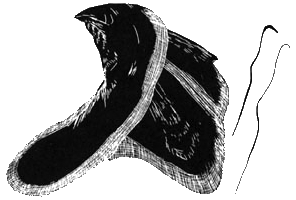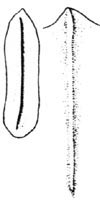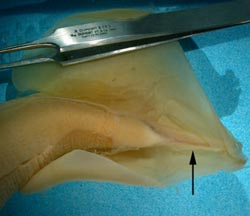
Click on an image to view larger version & data in a new window

Figure. Ventral view of K. longimana, 195 mm ML, ELTANIN sta. 1392, NMNH specimen, preserved. Photograph by R. Young.
- Arms
- Arms about 110-120% of the ML; subequal with Arms I slightly the shortest.
- Arms with wavy protective membrane and muscular supports (photograph to right).
- Arm suckers have smooth inner rings as is typical of the family. The suckers of arms IV are smaller than those of the other arms.

Click on an image to view larger version & data in a new window


Figure. Arm suckers of K. longimana. Left - Drawing from Filippova, 1972. Right - Oral view of a portion of an arm showing suckers and trabeculate protective membranes, 195 mm ML. Photograph by R. Young.
- Tentacles
- Carpus of club with 9-10 suckers (type series); 9-13 suckers (Clarke, 1980).
- Club with 33 hooks (type series); 30-39 hooks (Clarke, 1980); 27-38 hooks (Kubodera et al., 1998).
- 33 small, marginal suckers (type series).
- Terminal pad and distal portion of club (photograph at left) with 28 small suckers (type series); usually 24-28 (40 in one squid) small suckers (Clarke, 1980); 17-40 small suckers (Kubodera et al., 1998).

Click on an image to view larger version & data in a new window


Figure. Left - Two views (dorso-oral and ventral) of the distal club suckers of K. longimana, same club. Photograph by R. Young. Right - Hook from the tentacular club of K. longimana, holotype. Drawing from Filapova (1972).
Scanning electron micrographs of the club hooks can be seen here.
- Head
- Three occipital folds present.
- Beaks
- Upper beak with dark pigment patch on crest.
- The lower beak has the following characteristics. The hood is less than half the crest length; posteriorly the hood is well above the crest; the jaw angle is obtuse; a prominent lateral-wall fold is present (Clarke, 1980).

Click on an image to view larger version & data in a new window


Figure. Side view of beaks of K. longimana. Left - Upper beak. Drawing from Filippova (1972). Lower beak with sections through the crest and lateral wing. Drawing from Clarke (1980).
- Funnel
- Funnel groove rounded anteriorly.
- Mantel component of the funnel-mantle locking apparatus is much longer than the funnel component.

Click on an image to view larger version & data in a new window

Figure. Funnel and mantle components of the locking apparatus of K. longimana. Drawing from Filippova, 1972.
- Fins
- Fins with rhomboidal shape.
- Length 42% of ML (paratypes); 31-40% of ML (Clarke, 1980).
- Width 29-43% of ML (paratypes); 29-48% of ML (Clarke, 1980).

Click on an image to view larger version & data in a new window

Figure. Ventral view of fins and gladius rostrum of K. longimana, 195 mm ML. Note the long rostrum (arrow); its length appears to be more than the maximum 8% of the ML. Photograph by R. Young.
Comments
Except where noted and except for the photographs, the description is from Filippova (1972).
References
Clarke, M. R. 1980. Cephalopoda in the diet of sperm whales of the Southern Hemisphere and their bearing on sperm whale biology. Discovery Reports, 37: 1-324.
Kubodera, T., U. Piatkowski, T. Okutani and M.R. Clarke. 1998. Taxonomy and Zoogeography of the Family Onychoteuthidae (Cephalopoda: Oegopsida). Smithsonian Contributions to Zoology, No. 586: 277-291.
About This Page

University of Hawaii, Honolulu, HI, USA

National Museum of Natural History, Washington, D. C. , USA
K.S.R. Bolstad

Auckland University of Technology
Correspondence regarding this page should be directed to K.S.R. Bolstad at
Page copyright © 2003 , , and K.S.R. Bolstad
 Page: Tree of Life
Kondakovia longimana: Description Continued
Authored by
Richard E. Young, Michael Vecchione, and K.S.R. Bolstad.
The TEXT of this page is licensed under the
Creative Commons Attribution-NonCommercial License - Version 3.0. Note that images and other media
featured on this page are each governed by their own license, and they may or may not be available
for reuse. Click on an image or a media link to access the media data window, which provides the
relevant licensing information. For the general terms and conditions of ToL material reuse and
redistribution, please see the Tree of Life Copyright
Policies.
Page: Tree of Life
Kondakovia longimana: Description Continued
Authored by
Richard E. Young, Michael Vecchione, and K.S.R. Bolstad.
The TEXT of this page is licensed under the
Creative Commons Attribution-NonCommercial License - Version 3.0. Note that images and other media
featured on this page are each governed by their own license, and they may or may not be available
for reuse. Click on an image or a media link to access the media data window, which provides the
relevant licensing information. For the general terms and conditions of ToL material reuse and
redistribution, please see the Tree of Life Copyright
Policies.














 Go to quick links
Go to quick search
Go to navigation for this section of the ToL site
Go to detailed links for the ToL site
Go to quick links
Go to quick search
Go to navigation for this section of the ToL site
Go to detailed links for the ToL site